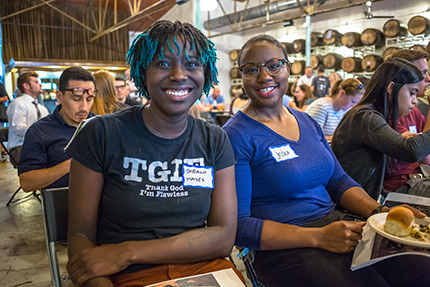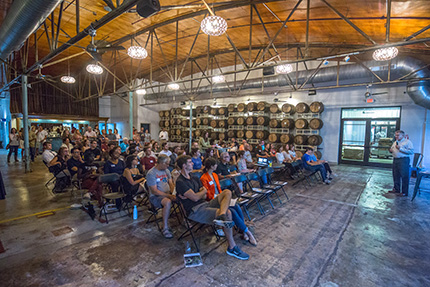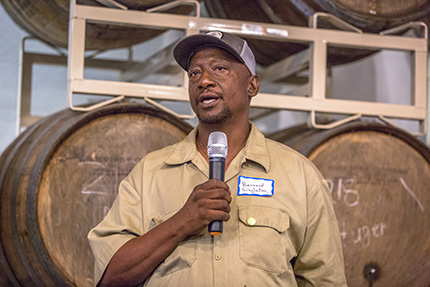“Growing” our local food systems
You may be familiar with your local farmers market, or try to buy locally grown foods when you grocery shop. But do you know how our Charlotte-regional food economy stacks up against other peer regions? On September 12th, over 100 people joined us at The Barrel Room at Catawba Brewing to learn about local foods and how they can make a difference. We were excited to have representatives from Carolina Farm Trust, Charlotte-Mecklenburg Food Policy Council, and Rivendell Farms in the room to talk to people about the work they’re doing, in addition to our presenter, Tom Warshauer, Assistant Director of Community Engagement for the City of Charlotte.

Sustain Charlotte event at Catawba Brewing Co. Sept. 13, 2018
Tom shared the results of the City’s recent study on farmers markets and food systems. The City undertook this study, Tom told attendees, because it cares about building a community that is equitable, and has heard people’s desires for places where they can meet each other in authentic ways. Food plays a central role in building those types of connections. The City also recognizes that part of the picture of our food economy is missing because we’re not connecting local farms with urban food markets, and the City wanted to find out what role individuals and the City could play in addressing food deserts.

Sustain Charlotte event at Catawba Brewing Co. Sept. 13, 2018
What did the study show?
Charlotte has the ingredients for a strong regional food economy; we have good soil and can grow year-round. But, we aren’t living up to the market demand in direct to consumer sales. In other words, we have people who want to eat local, but they aren’t able to access locally grown food.
One of the challenges we’re facing as a region is that we lost over ⅓ of our farms and over ½ our farm acreage from 1997-2012. One way to potentially prevent additional loss in the future would be to create a Voluntary Agricultural District (VAD), which could help protect local farms.
Another obstacle we face is that the Charlotte Regional Farmers’ Market under performs compared to other state farmers markets. The state and local governments needs to look at what could be done to help it do a better job of responding to the geography of food access and need (i.e., food deserts).
In the end, Tom shared several steps that the report recommended be taken to help alleviate some of these challenges.
Recommendations:
- Create a Farmers’ Market Association
- Make improvements to the Regional Farmers’ Market
- Include food planning in cross-city planning (especially as related to things like transportation)
- Foster career pathways in farming

Sustain Charlotte event at Catawba Brewing Co. Sept. 13, 2018
Audience members had a chance to ask questions of Tom, as well as our other local foods partners in the room, and discussion ranged from why local chefs aren’t able to use more local foods, to questions about whether a VAD will actually help farmers, and more. Tom ended the program by sharing this one thing that attendees could do to help improve local food systems: Look at the executive summary of this report and ask your City and State elected officials to come to the table with financing for the recommendations. With one of Charlotte’s Council members in attendance, we’re hoping the City will take action to move these recommendations forward.
You can read the full Executive Summary of the City’s food systems study here.
We greatly appreciate the time of all of our partners who helped make this event a success. Special thanks to Rivendell Farms for sponsoring our food for the evening.
Couldn’t make it to the event? Check out the video and photos on Facebook! Photos by Grant Baldwin Photography.
Thanks for reading!
As a nonprofit, community support is essential for us to keep doing what we do — including providing free articles like this. If you found this article helpful, please consider supporting Sustain Charlotte.
Want to stay in the loop? Subscribe to our weekly newsletter and follow us on Instagram, Facebook, and Twitter.
